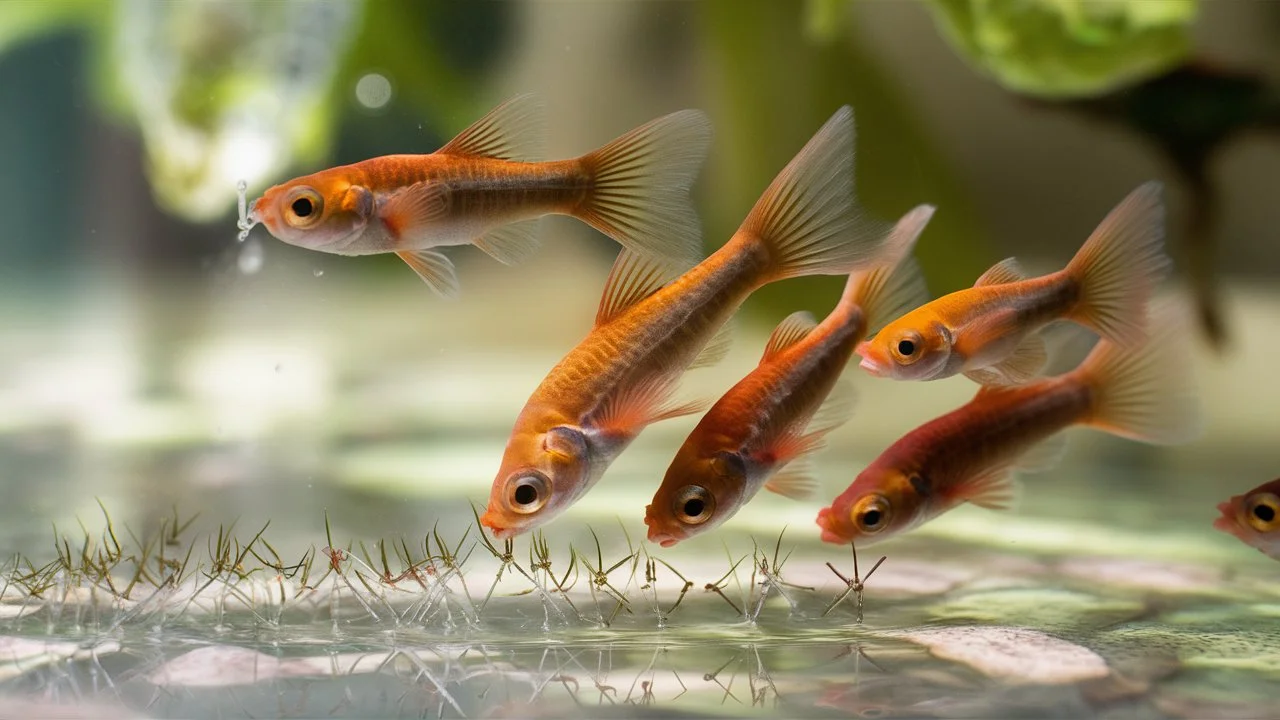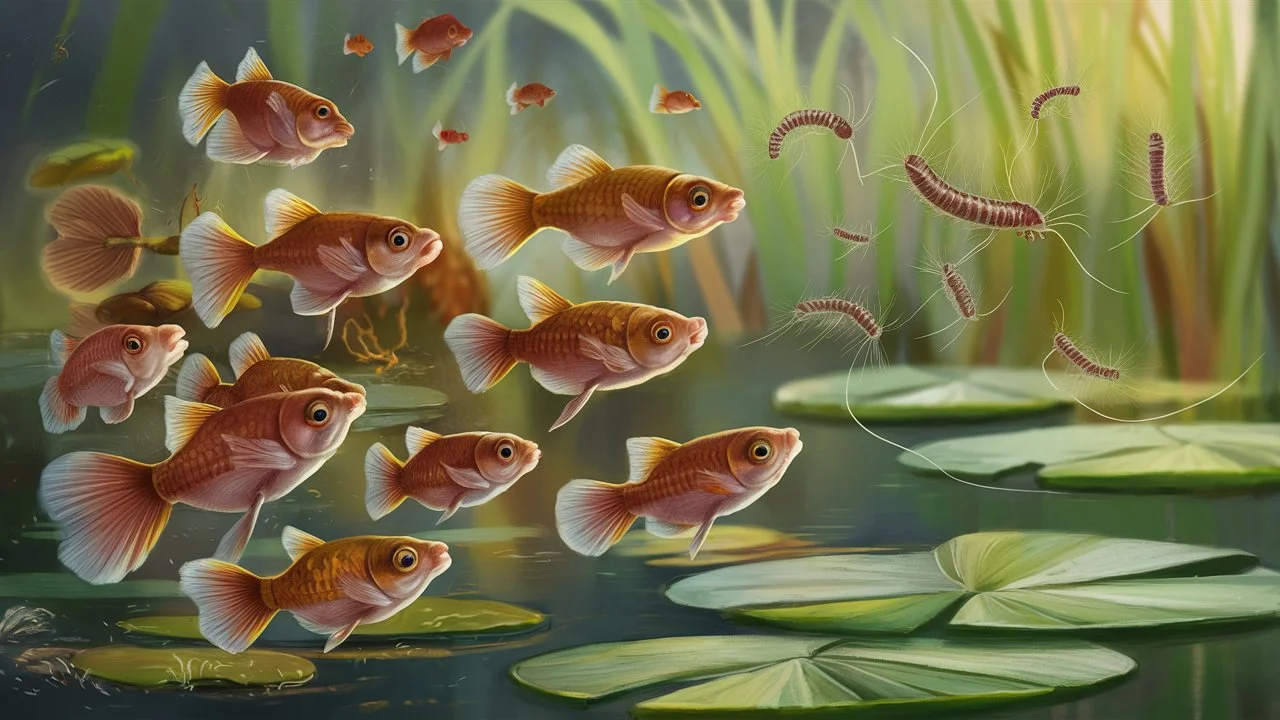Mosquitoes are more than just a nuisance; they are vectors for numerous serious diseases such as malaria, dengue fever, and Zika virus. Controlling mosquito populations is crucial for public health, and while chemical insecticides are commonly used, they come with environmental and health concerns. Enter the humble guppy—a small, colorful freshwater fish known for its appetite for mosquito larvae. Utilizing guppies for mosquito control offers an eco-friendly, sustainable alternative to chemical methods. This comprehensive guide will delve into how guppies can be used to manage mosquito populations, exploring their biology, effectiveness, implementation strategies, and the benefits and challenges of this natural solution.
Yes, guppies do eat mosquito larvae. In fact, guppies are often used in mosquito control programs because they are effective at consuming large quantities of mosquito larvae. This natural predation helps reduce mosquito populations and the spread of mosquito-borne diseases. Guppies are efficient at hunting and consuming mosquito larvae, making them beneficial for controlling mosquitoes in ponds, water gardens, and other bodies of water where mosquitoes may breed.
Guppies and Mosquito Larvae: A Natural Solution to Mosquito Control
Guppies are small freshwater fish known for their vibrant colors and easy care, are more than just popular aquarium pets. These tiny fish play a significant role in controlling mosquito populations by feeding on mosquito larvae. This natural predation is not only fascinating but also highly beneficial in reducing the spread of mosquito-borne diseases. In this comprehensive guide, we will explore the relationship between guppies and mosquito larvae, the benefits of using guppies for mosquito control, and how to implement this method effectively.
Related reading: Guppies vs. Cherry Shrimp
Understanding Guppies
Guppy Biology and Behavior Guppies (Poecilia reticulata) are small tropical fish native to northeastern South America. They are known for their hardy nature, adaptability to different water conditions, and prolific breeding. Guppies thrive in a variety of aquatic environments, from rivers and streams to ponds and ditches.
- Diet: Guppies are omnivorous, feeding on algae, plant matter, small invertebrates, and insect larvae, including mosquito larvae.
- Breeding: Guppies are livebearers, meaning they give birth to free-swimming young rather than laying eggs. This characteristic allows them to quickly populate new environments.
- Lifespan: Guppies typically live for 1 to 3 years, depending on environmental conditions and care.
Mosquito Larvae: A Primary Food Source
Mosquito larvae, also known as “wigglers,” are the immature stage of mosquitoes. They develop in standing water and are a crucial food source for many aquatic organisms, including guppies. The larvae are filter feeders, consuming microorganisms and organic debris in the water.
- Lifecycle: Mosquitoes go through four stages in their lifecycle: egg, larva, pupa, and adult. The larval stage lasts for several days to a few weeks, depending on the species and environmental conditions.
- Habitat: Mosquito larvae thrive in stagnant water found in ponds, ditches, birdbaths, and other water-holding containers.
The Role of Guppies in Mosquito Control
Natural Predation Guppies are highly effective at consuming mosquito larvae, making them a valuable tool in mosquito control efforts. They actively hunt and consume the larvae, reducing the number of mosquitoes that reach adulthood.
- Efficiency: A single guppy can consume dozens of mosquito larvae each day. In controlled studies, guppies have been shown to significantly reduce larval populations in a matter of days.
- Behavior: Guppies are active hunters, constantly foraging for food. This behavior makes them particularly effective in environments with high mosquito larval densities.
Environmental Benefits Using guppies for mosquito control offers several environmental benefits compared to chemical insecticides and other control methods.
- Eco-friendly: Unlike chemical treatments, guppies do not introduce harmful substances into the environment. They provide a natural, sustainable solution to mosquito control.
- Biodiversity: Introducing guppies to water bodies can enhance local biodiversity by providing a food source for other predators and contributing to the aquatic ecosystem.
Implementing Guppies for Mosquito Control
Suitable Environments Guppies can be introduced to a variety of water bodies where mosquito larvae are likely to thrive. Suitable environments include:
- Ponds and Water Gardens: Guppies can help control mosquito populations in ornamental ponds and water gardens. Ensure the water is free of chemicals harmful to fish.
- Rain Barrels: Adding guppies to rain barrels can prevent mosquito breeding in stored rainwater.
- Natural Water Bodies: Guppies can be introduced to ditches, streams, and other natural water bodies, provided the conditions are suitable for their survival.
Water Quality and Maintenance Maintaining proper water quality is essential for the health and effectiveness of guppies in mosquito control.
- Temperature: Guppies prefer water temperatures between 72°F and 82°F (22°C to 28°C). In colder climates, they may need to be kept indoors or in heated water bodies.
- pH and Hardness: Guppies thrive in water with a pH between 6.8 and 7.8 and moderate hardness.
- Oxygenation: Ensure the water is well-oxygenated. Installing a small aerator or water pump can help maintain adequate oxygen levels.
Stocking and Care Properly stocking and caring for guppies is crucial to their success in controlling mosquito larvae.
- Stocking Density: A general guideline is to introduce about 10 guppies per square meter of water surface area. This density can vary based on the specific conditions and mosquito population.
- Feeding: While guppies will feed on mosquito larvae, supplementing their diet with fish flakes or other suitable fish food can ensure they receive adequate nutrition.
- Monitoring: Regularly monitor the guppy population and water quality. Remove any debris or obstacles that could impede their movement and feeding.
Challenges and Considerations
Predation and Competition Guppies may face predation from larger fish or birds in natural water bodies. Additionally, competition for food with other aquatic organisms can impact their effectiveness.
- Protection: Providing hiding spots with aquatic plants or rocks can help protect guppies from predators.
- Coexistence: In environments with high competition, ensuring adequate food supply and reducing overcrowding can help guppies thrive.
Climate and Seasonal Changes Guppies are sensitive to temperature fluctuations and may not survive in colder climates without additional care.
- Winter Care: In temperate regions, guppies may need to be brought indoors during the winter months. Setting up an indoor aquarium can provide a suitable environment until temperatures rise.
- Seasonal Monitoring: Monitor guppy populations and water quality throughout the year to address any seasonal changes that may affect their health and effectiveness.
Ethical and Environmental Considerations Introducing non-native species to new environments can have ecological implications. It’s important to consider the potential impact on local ecosystems and follow any regulations or guidelines for introducing guppies.
- Native Species: In some regions, native fish species may also be effective at controlling mosquito larvae. Researching local options can provide an alternative to introducing non-native guppies.
- Regulations: Check with local wildlife or environmental agencies to ensure compliance with regulations regarding the introduction of guppies to natural water bodies.
Conclusion
Guppies are a natural and effective solution for controlling mosquito populations by consuming mosquito larvae. Their ability to thrive in various aquatic environments, combined with their predation efficiency, makes them a valuable tool in integrated mosquito management programs. By understanding their nutritional needs, maintaining proper water quality, and addressing potential challenges, guppies can be successfully used to reduce mosquito populations and mitigate the spread of mosquito-borne diseases. This eco-friendly approach not only benefits human health but also supports the health of aquatic ecosystems, making guppies a sustainable choice for mosquito control.


1 thought on “Do Guppies Eat Mosquito Larvae? Natural Control Method”